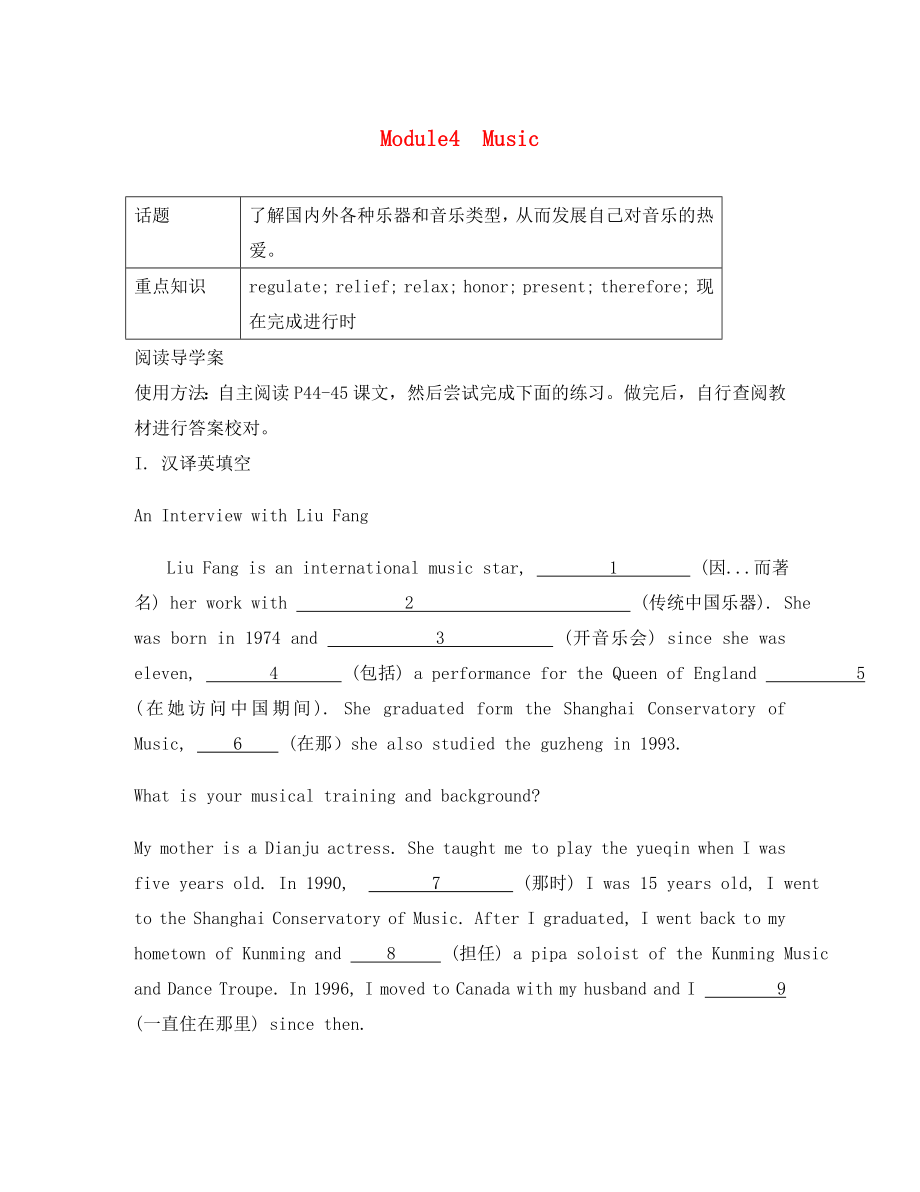《2020屆高三英語(yǔ)一輪復(fù)習(xí) Module 4 Music閱讀案(無(wú)答案)外研版選修6》由會(huì)員分享��,可在線閱讀�,更多相關(guān)《2020屆高三英語(yǔ)一輪復(fù)習(xí) Module 4 Music閱讀案(無(wú)答案)外研版選修6(3頁(yè)珍藏版)》請(qǐng)?jiān)谘b配圖網(wǎng)上搜索���。
1�、Module4 Music
話題
了解國(guó)內(nèi)外各種樂(lè)器和音樂(lè)類型,從而發(fā)展自己對(duì)音樂(lè)的熱愛(ài)����。
重點(diǎn)知識(shí)
regulate; relief; relax; honor; present; therefore; 現(xiàn)在完成進(jìn)行時(shí)
閱讀導(dǎo)學(xué)案
使用方法:自主閱讀P44-45課文,然后嘗試完成下面的練習(xí)�����。做完后�����,自行查閱教材進(jìn)行答案校對(duì)����。
I. 漢譯英填空
An Interview with Liu Fang
Liu Fang is an international music star, 1 (因...而著名) her work with
2、 2 (傳統(tǒng)中國(guó)樂(lè)器). She was born in 1974 and 3 (開(kāi)音樂(lè)會(huì)) since she was eleven, 4 (包括) a performance for the Queen of England 5 (在她訪問(wèn)中國(guó)期間). She graduated form the Shanghai Conservatory of Music, 6 (在那)she also studi
3����、ed the guzheng in 1993.
What is your musical training and background?
My mother is a Dianju actress. She taught me to play the yueqin when I was five years old. In 1990, 7 (那時(shí)) I was 15 years old, I went to the Shanghai Conservatory of Music. After I graduated, I went back to my ho
4、metown of Kunming and 8 (擔(dān)任) a pipa soloist of the Kunming Music and Dance Troupe. In 1996, I moved to Canada with my husband and I 9 (一直住在那里) since then.
What are the biggest challenges of playing the pipa and the guzheng?
If your technique is not good enough,
5���、 10 (是不可能演奏) classical Chinese pipa music.
There are many different pipa schools, 11 (它們中每一個(gè)) has its special way of interpreting the classical pieces. 12 (最大的挑戰(zhàn)是) to respect the traditions but to add my own style. 13 (.…..也是如此)
6����、my second instrument, the guzheng.
Ⅱ. 語(yǔ)法填空
What characteristics of Chinese classical music do you try to show in your playing?
Classical Chinese music and traditional Chinese painting are like twin sisters. In Chinese art, there are some empty spaces, which 1 (be) very important. They give lif
7、e 2 the whole painting and allow people to come into the picture, like a dialogue.
It is the same 3 classical Chinese music. There are empty spaces, and people say the silence is full of music. The pipa sounds and the pauses combine to make a poetry of sound.
What do you like best about pe
8���、rforming live?
I enjoy playing and I enjoy performing in public. I feel a little depressed or lonely when there is no concert 4 a long time. Immediately after the concert I also enjoy the time 5 (share) the feelings and ideas with friends and music lovers, listening to their 6 (impress)
9�、 and understanding about the music. I love my career. I also enjoy travelling: I enjoy sitting in a plane 7 (dream).
What are your goals as an artist?
I don’t have a particular goal. But I hope to work with many composers, and I also wish to compose my own music. Since I moved to Canada, I
10�、 8 (have) opportunities to make contact with other musical traditions and play with master 9 (music). I wish to continue with them and to be able to compose my own music, 10 (use) elements from different cultures.
III. 課文重點(diǎn)句型翻譯:
1.有很多不同的教琵琶的學(xué)校,而且每一所學(xué)校都有自己獨(dú)特的詮釋古典曲目的方式���。
________________
11���、_________________________________________________________
2. 在漢語(yǔ)中,同一個(gè)發(fā)音的不同聲調(diào)有不同的含義����。 音樂(lè)也是如此����。
_________________________________________________________________________
3. 聆聽(tīng)者可以體驗(yàn)音樂(lè)的力量和美好,就像欣賞一首美妙的詩(shī)歌或畫(huà)作一樣�����。
_________________________________________________________________________
4. 我希望把古典的中國(guó)琵琶和古箏音樂(lè)推廣到世界的每一個(gè)角落。
_________________________________________________________________________
 2020屆高三英語(yǔ)一輪復(fù)習(xí) Module 4 Music閱讀案(無(wú)答案)外研版選修6
2020屆高三英語(yǔ)一輪復(fù)習(xí) Module 4 Music閱讀案(無(wú)答案)外研版選修6

